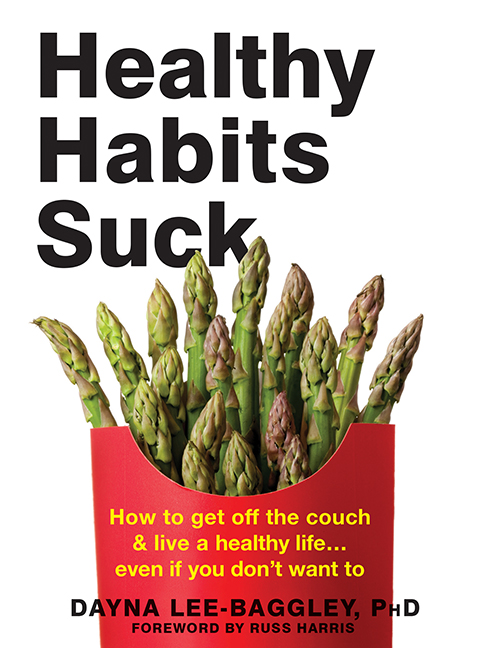By Dayna Lee-Baggley, PhD, author of Healthy Habits Suck
According to Gilbert, Tirch, and Silberstein, compassion (self- and other) can be understood as recognizing suffering and wanting to do something to alleviate it. Neff defines self-compassion as involving three main parts. The first is self-kindness: being kind, caring, and loving to oneself. The second is common humanity: recognizing that setbacks, personal feelings, and mistakes are all part of being human. And the third is mindfulness: being able to notice and be present in a nonjudgmental way. Together these definitions serve to help us understand that self-compassion involves recognizing our own pain and suffering as part of the human experience, and responding to that with mindfulness and kindness.
Research suggests that self-compassion is linked to improved health, life satisfaction, and well-being; and to lower levels of anxiety, depression, and stress. But self-compassion is not just something that makes us healthier; it is also necessary to maintain healthy habits in the long run.
Managing weight in the long term is a difficult process. It’s often the case that weight loss isn’t the hardest part; weight maintenance is even harder. This is because our bodies have evolved over time to try to fight to get back to a higher weight after weight loss. After weight loss, our bodies think that we’ve just been through a famine or a long winter. And bodies employ numerous systems to try to restore the lost weight, such as reducing metabolism and increasing hunger and appetite. Not only are we fighting our own bodies in trying to maintain weight loss, we are often faced with an environment that actively undermines healthy choices. Our environment is stacked with cues and access to unhealthy foods. Have you ever seen a billboard advertising broccoli? I bet not as often as you’ve seen one offering some delicious meal or treat that likely has many more calories than you need. Culturally we use food as rewards, to socialize, to express support and affection. Name a holiday that doesn’t involve food? Chances are, you’re more likely to find donuts than a plate of fruit and vegetables in an office meeting. As a result of all these pressures, it is a common occurrence to “fall off the wagon” in managing weight.
It’s therefore not so much a question of if you will fall off the wagon, but how long does it take you to get back on. We can undo a lot of our efforts when we’re off the wagon. Does it take you until January 1, or Monday morning, or the next meal to get back on track? Research shows that when we can be compassionate with ourselves, we get back on the wagon more quickly. When we shame and blame ourselves (or get shamed and blamed by others), we go back to the unhealthy habits. It’s when we feel supported, understood, and safe that we do new and difficult things.
Here’s one way to be more compassionate (either to yourself or to someone else struggling with weight), called “the compassionate reality check.” Think of how many factors influence weight that are not your choice and not your fault. You didn’t choose to be born in this era in the Western world where food is plentiful, you didn’t choose your genetics, you didn’t choose your parents, you didn’t choose to have a brain that is hardwired toward unhealthy habits. All these things influence weight, and they are not your fault and not your choice. So, can we be kind to ourselves or others about the fact that managing weight is actually very difficult because of all these factors. These factors end up being your responsibility, but they are not your fault.
So, the next time you eat too much at a buffet, or drink more than you wanted to, or skip the gym, can you respond to yourself with kindness? Can you recognize that everyone has setbacks, and that whatever “mistake” you made you were likely just acting the way millions of years of evolution have shaped you to act? Can you acknowledge that because of all kinds of factors that were not your choice, weight management is really hard? Can you respond gently and kindly to your setback so that you can get back on the wagon? And, if you don’t respond kindly in the face of a setback, you can be kind to yourself about that too?
Dayna Lee-Baggley, PhD, exercises regularly and rarely enjoys it. She is a regular runner who competes in 10K races and never gets a runner’s high. She drinks green smoothies and hates vegetables. Every time her kid asks her to go do some physical activity (biking, swimming, etc.) she thinks “Crap, I don’t want to do that,” and she does it anyway. Dayna is also a health psychologist and registered clinical psychologist.



 Building Self-Acceptance
Building Self-Acceptance